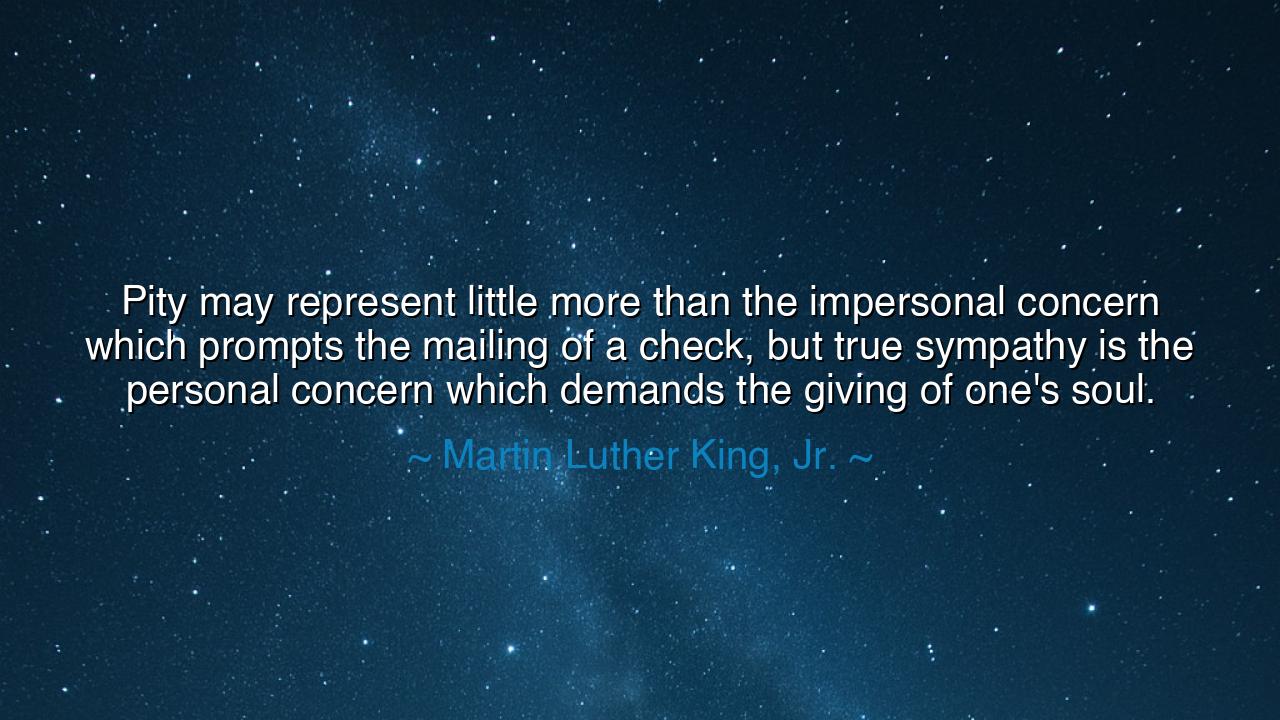
Pity may represent little more than the impersonal concern which
Pity may represent little more than the impersonal concern which prompts the mailing of a check, but true sympathy is the personal concern which demands the giving of one's soul.






"Pity may represent little more than the impersonal concern which prompts the mailing of a check, but true sympathy is the personal concern which demands the giving of one's soul." — Martin Luther King, Jr. In these powerful words, Dr. King draws a profound distinction between two forms of human emotion: pity and sympathy. Pity, he suggests, is a shallow response—a distant, impersonal concern that might be expressed through a simple action, like sending a check. It is an act of charity without true connection, a gesture that alleviates the giver’s conscience but does not engage the heart. In contrast, sympathy is a deep, personal concern that requires more than just a token action; it calls for the giver to engage wholly, to invest their soul in the suffering of another. To offer true sympathy is to make oneself vulnerable, to connect with another's pain on a level that transcends mere formality.
The ancient philosophers recognized this distinction long ago. Consider Aristotle, who, in his Nicomachean Ethics, spoke of virtue as a balanced state between excess and deficiency. Pity, in this sense, could be seen as a form of excess, an emotion that, though not inherently bad, can become hollow when it is not accompanied by true action and deep empathy. Sympathy, on the other hand, aligns with virtue—a careful, thoughtful response that requires an active engagement with another’s suffering. Aristotle teaches that true compassion is an action taken not to alleviate one’s own discomfort, but to genuinely ease the suffering of others. King, like the philosophers of old, shows us that sympathy, when it is truly felt, requires much more—it requires the giving of one's soul, not merely a gesture to ease a burden.
Think, too, of the story of Hercules in ancient Greek mythology. His Twelve Labors were acts of great sacrifice, undertaken not because he was seeking glory or fame, but because he recognized the suffering of others and chose to give of himself. Each labor demanded not only his physical strength but his soul, his very essence. He did not act out of pity—simply to fulfill a duty or offer a quick resolution—but from true sympathy, an understanding of the deep pain and suffering of others. His journey, filled with trials and sacrifices, speaks to King’s understanding of sympathy: that it is not enough to simply send a check or give a passing nod to the plight of others; to be truly compassionate is to sacrifice something of yourself.
Dr. King, in his life and his work, embodied the essence of true sympathy. His leadership during the Civil Rights Movement was not merely a matter of addressing injustice through speeches and legislation—it was the giving of his soul to the cause of freedom and equality. King understood that sympathy was not an impersonal gesture; it was a personal commitment to the well-being of others, a willingness to face pain and suffering head-on, to risk everything in pursuit of justice for those who were oppressed. His involvement in the Montgomery Bus Boycott, his steadfast leadership, his willingness to face imprisonment and violence—all these actions were the result of a deep, personal concern for the suffering of his fellow humans. In every step, he was giving not just his time or resources, but his very being to the cause.
The lesson of King’s words is clear: pity is not enough. Sympathy, in its truest form, requires something more—a sacrifice of the self. It demands that we engage with the suffering of others on a personal level, not through detached charity, but through genuine empathy. It requires that we put aside our own comfort and invest ourselves—our time, our energy, our soul—in alleviating the pain of those who are suffering. When we see injustice or hardship in the world, we must ask ourselves: are we responding with pity, a quick fix that allows us to move on, or are we responding with sympathy, an active choice to engage, to care, and to give of ourselves?
In our own lives, we are constantly faced with moments where we can either offer pity or extend sympathy. When a friend is in distress, it is easy to offer words of comfort or a brief token of help—these are acts of pity. But true sympathy asks us to take the time to listen, to understand, to walk beside them in their pain, and to share in the burden. It is not about solving their problems for them, but about offering our hearts, our presence, and our support. In this way, we can build communities founded not on mere charity, but on genuine care, where each person gives not just what is easy, but what is deeply personal.
The challenge, then, is to move beyond the superficial and into the realm of true connection. Pity may feel good in the moment, but it is fleeting. Sympathy, however, is a lasting force—it transforms both the giver and the receiver. Let us follow in the footsteps of King, and of the great heroes and philosophers who have come before us, by offering our soul in service to others. In doing so, we honor the true spirit of compassion, and we become the change we wish to see in the world.






AAdministratorAdministrator
Welcome, honored guests. Please leave a comment, we will respond soon